
REGULATORY COMPLIANCE BULLETIN (Newsletter – April 2025)
BIS-ISI
BIS Quality Control Order for Hinges
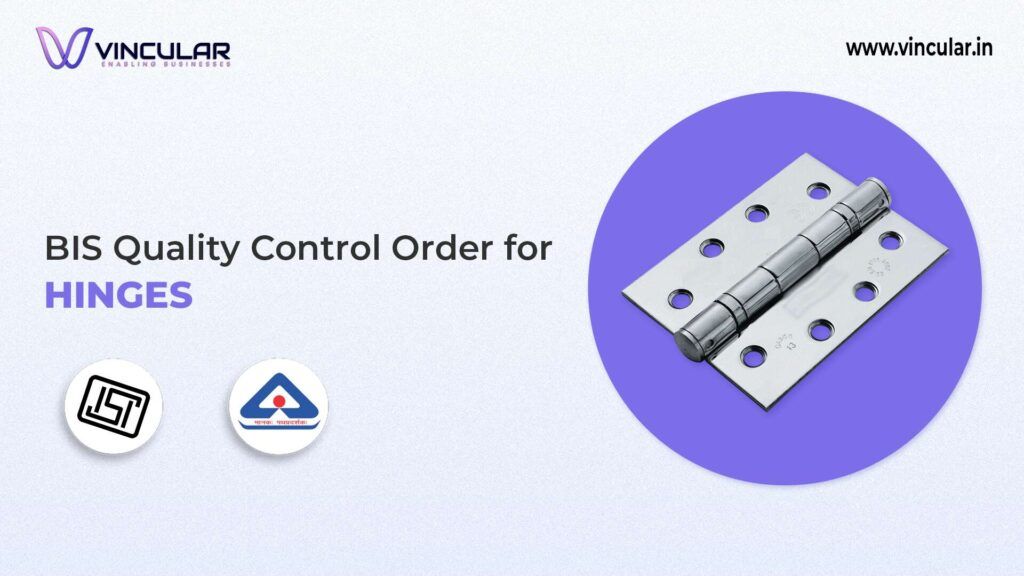
The Ministry of Commerce and Industry notified Hinges (Quality Control) Order on 21st March 2025. This Order may be called the Hinges (Quality Control) Order, 2025. This order was initially set to take effect on January 1, 2025, the enforcement date of the QCO order has now been revised to July 1, 2025.
All goods or articles mentioned in the order must comply with their respective Indian standard and must display the Standard Mark, authorized by a license from the Bureau of Indian Standards, by Scheme-1 of Schedule-II of the Bureau of Indian Standards (Conformity Assessment) Regulations, 2018.
The following goods/articles are covered under the Hinges (Quality Control) Order –
-
Stainless Steel Butt Hinges: IS 12817:2020
-
Steel Butt Hinges: IS 1341:2018
-
Non-ferrous metal butt Hinges: IS 205:1992
-
Tee and Strap Hinges: IS 206:2010
-
Parliament Hinges: IS 362: 1991
-
Continuous (Piano) Hinges: IS 3818:1992
-
Steel back flap Hinges: IS 3843:1995
-
Double-acting Spring Hinges: IS 453:1993
-
Cabinet Hinges: IS 18297:2023
Implementation date: 1st July 2025
Exemptions under the Quality Control Order (QCO):
Export Exemption: The order does not apply to goods or articles manufactured domestically for export.
Research & Development (R&D) Exemption: The order does not apply to 200 goods or articles per year imported for R&D purposes by manufacturers of hinges. Conditions:
-
These goods/articles shall not be sold commercially.
-
They must be disposed of as scrap.
-
The manufacturer must maintain year-wise records and submit them to the Central Government on their letterhead, duly signed by an authorized signatory.
Link to Official Document: Hinges (Quality Control) Order, 2025
Ethylene Dichloride, Vinyl Chloride Monomer & Polycarbonate (Quality Control) Amendment Order

The Ministry of Chemicals and Fertilizers introduced the Ethylene Dichloride, Vinyl Chloride Monomer & Polycarbonate (Quality Control) Amendment Order 2025, on 11th March 2025, which will come into force on 12th September 2025.
This order requires that Ethylene Dichloride (IS 869: 2020), Vinyl Chloride Monomer (IS 17442: 2020) & Polycarbonate (IS 14434: 2023) must comply with their respective Indian Standards. The products must display the Standard Mark under a license from the Bureau of Indian Standards, under Scheme-I of Schedule-II of the Bureau of Indian Standards (Conformity Assessment) Regulations, 2018.
Please refer to the official document: Ethylene Dichloride, Vinyl Chloride Monomer & Polycarbonate (Quality Control) Amendment Order 2025
Beta Picoline, Sodium Tripolyphosphate & Pyridine (Quality Control) Amendment Order
The Ministry of Chemicals and Fertilizers introduced the Beta Picoline, Sodium Tripolyphosphate & Pyridine (Quality Control) Amendment Order 2025, on 11th March 2025, which will come into force on 13th March 2026.
This order requires that Beta Picoline (IS 16112: 2013), Sodium Tripolyphosphate (IS 6100: 2021) & Pyridine (IS 8058: 2018) must comply with their respective Indian Standards. The products must display the Standard Mark under a license from the Bureau of Indian Standards, by Scheme-I of Schedule-II of the Bureau of Indian Standards (Conformity Assessment) Regulations, 2018.
Please refer to the official document: Beta Picoline, Sodium Tripolyphosphate & Pyridine (Quality Control) Amendment Order 2025
p-Xylene and Polyurethanes (Quality Control) Amendment Order
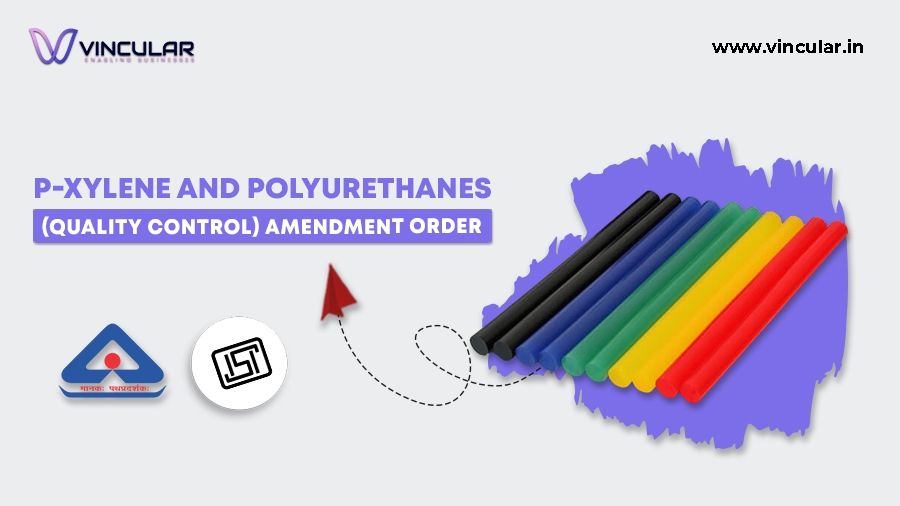
The Ministry of Chemicals and Fertilizers introduced the p-Xylene and Polyurethanes (Quality Control) Amendment Order 2025, on 19th March 2025, which will come into force on 19th December 2025.
This order requires that p-Xylene (IS 17370:2020) and Polyurethanes (IS 17397 (Part 1): 2020) must comply with their respective Indian Standards. The products must display the Standard Mark under a license from the Bureau of Indian Standards, by Scheme-I of Schedule-II of the Bureau of Indian Standards (Conformity Assessment) Regulations, 2018.
Please refer to the official document: p-Xylene and Polyurethanes (Quality Control) Amendment Order 2025
BIS-CRS
BIS updated BIS Guidelines for Solar Batteries Implementation (IS 16270: 2023)
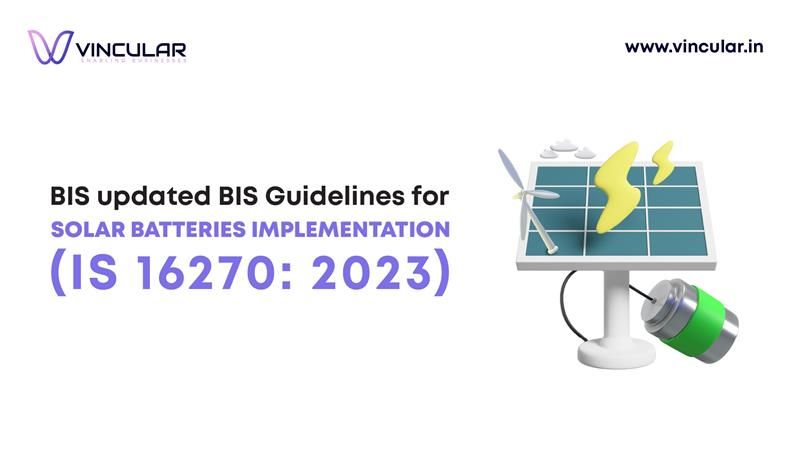
The Bureau of Indian Standards (BIS) has issued guidelines for implementing IS 16270: 2023, covering secondary cells and batteries for solar photovoltaic applications. This change comes under the Solar Systems, Devices, and Components Goods Order, 2025.
Key Highlights:
-
Maximum Charge Current I10A
-
Inclusion of Lithium Battery Type and other electrochemistry
-
Inclusion of standards for Lithium Cells and Batteries
-
Inclusion of long-duration capacity
-
Inclusion of capacity requirement of rated capacity
How to implement new standard (IS 16270: 2023)
For Existing Licensees:
-
Before the last date, licensees have to implement the revised standard.
-
Licenses have to submit a test report issued by the BIS-accredited labs for all lead models for IS 16270: 2023
-
Licensees also have to submit an undertaking stating that requirements of IS 16270: 2023 have been implemented in other existing series models (s) that are in the scope of the licence.
For New applicants:
-
If the application submission is in process, then they have to submit a declaration letter that they will implement the revised standard by the last date (27 July 2025)
-
After 27 July 2025. No licence shall be granted as per the old standard.
The official notification is below: Guidelines for implementing IS 16270: 2023
MeitY Extends Implementation Deadline for Digital Television Receiver for Satellite Broadcast Transmission Compulsory Registration Order
The Ministry of Electronics and Information Technology (MeitY) has extended the compliance deadline for IS 18112:2022 (Digital Television Receiver for Satellite Broadcast Transmission) under the Compulsory Registration Order (CRO). This decision was made after discussions with industry stakeholders to ensure a smooth implementation process.
New Compliance Deadline
- Standard: IS 18112:2022
- Extended Deadline: 26th October 2025
Decoding the Compliance for the manufacturer
-
Mandatory Compliance: All TVs manufactured or imported into India must meet IS 18112:2022 requirements alongside existing safety standards.
-
Inclusion Process: Existing licensees must update their registrations to include IS 18112:2022, following the safety requirements of IS 616:2017/IEC 60065:2014.
-
Series Guidelines: Existing guidelines for Plasma, LCD, and LED TVs will apply when integrating Digital Television Receiver compliance.
-
Post-Deadline Impact: After 26th October 2025, models certified only under IS 616:2017/IEC 60065:2014 will no longer be valid under the license.
Standard Mark & Licensing
-
Once approved by BIS, licenses will display both IS 616/IEC 60065 and IS 18112 standards.
-
A single registration number will apply for both standards, displayed below the Standard Mark.
-
Below is the sample logo
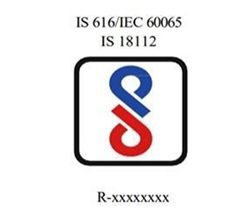
Key Benefits of the Extension
- More time for manufacturers, the government, and BIS-accredited labs to build the necessary infrastructure.
- Currently, there are only two BIS-accredited labs, authorised to conduct the testing.
- Additional R&D time for manufacturers to align with IS 18112:2022 specifications.
Miety issued ER-01 Compliance Exemption for Analog CCTV Cameras
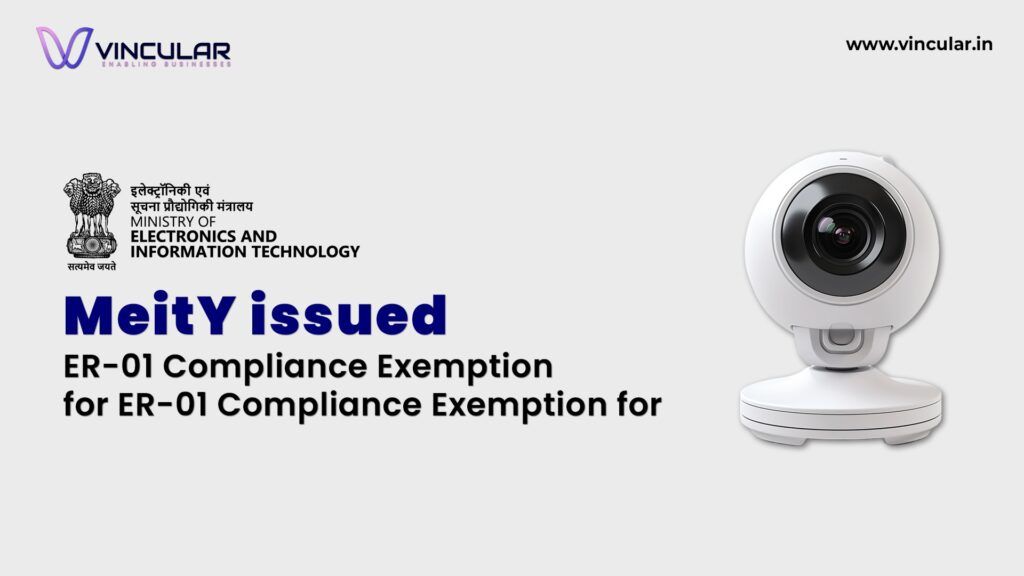
MEITY has released two recent regulatory updates concerning CCTV camera compliance in India:
-
MEITY Notification – Dated 12th March 2025: MEITY has officially clarified that ER-01 compliance is not required for Analog CCTV Cameras.
-
BIS Notification – Dated 1st April 2025: The Bureau of Indian Standards (BIS) has issued detailed guidance on the process to be followed by applicants regarding ER-01 compliance for CCTV Cameras. The key points are as follows:
For Analog CCTV Camera Applicants:
-
Existing Manufacturers must submit a declaration via the “Standard Revision/Amendment/Essential Requirement” module to avail the exemption from ER-01 compliance.
-
Product Labelling: All analogue CCTV cameras must clearly indicate in their general product description that they are Analog Cameras, under IS 13252-1.
For other CCTV Camera Applicants:
Applicable Standards:
- IS 13252-1 (Safety Testing)
- ER-01 (Security Testing)
Compliance with both standards is mandatory before the deadline. After 9th April 2025, any non-compliant models will be removed from the scope of license by BIS.
Note: Applicants must not combine Analog and other types of CCTV Cameras in a single Application/Inclusion ID.
For complete details, please refer to the official BIS notification here: ER-01 Compliance Exemption
TEC
DoT Introduces Reimbursement Scheme for Telecom Startups and MSEs
Testing and certification play a crucial role in enabling telecom startups and Micro and Small Enterprises (MSEs) to gain acceptance both nationally and internationally. Certified products foster consumer trust, boost business growth, and accelerate adoption in domestic and global markets.
To support this, the Department of Telecommunications (DoT) has introduced a new initiative.
The Department of Telecommunication (DoT) has launched a scheme to reimburse testing and certification charges for Startups and MSEs in the telecom sector. This will apply to testing and certification done at designated labs like the Telecommunication Engineering Centre (TEC), National Centre for Communication Security (NCCS), and NABL-accredited labs.
Key Highlights:
Reimbursement criteria:
-
Start-ups: Up to 75% of the charges
-
Micro Enterprises: Up to 60% of the charges
-
Small Enterprises: Up to 50% of the charges
Duration: The scheme will run for two years or until the fund of ₹25 crores is fully utilized.
Eligibility: Testing at TEC/NCCS or NABL-accredited labs.
How to Apply: The scheme will be operational starting 5th March 2025, with applications being accepted from 10th March 2025 onwards at TEC Portal.
This initiative aims to grow in the telecom sector and make it easier for startups and MSEs to test, certify, and scale their solutions.
The official notification can be accessed from here.
Guidelines for reimbursement can be accessed from here.
For any queries, please write to us at tec@vincular.in
VOICE COMPLIANCE
TRAI Responds to DoT on Telecom Authorization Framework Under the 2023 Act
The Telecom Regulatory Authority of India (TRAI) has responded to the Department of Telecommunications (DoT) regarding its feedback on the service authorization framework under the Telecommunications Act, 2023. TRAI has reaffirmed its recommendations to streamline regulations and enhance industry growth.
Key Takeaways from TRAI’s Response:
-
Government-Led Authorizations: The Central Government should directly grant service authorizations, not through agreements.
-
Clear Service Categories: Authorizations should be structured into Main, Auxiliary, and Captive Services.
-
Support for VNOs: Virtual Network Operators should be allowed under each main service authorization.
-
Unified Service Authorization: A national-level authorization should cover key telecom services.
-
Financial & Compliance Regulations:
-
Bank Guarantee: This should be the higher of the first-year amount or 20% of the last two years’ revenue.
-
Revenue Terms: Existing definitions of GR, ApGR, and AGR should remain unchanged.
-
Separate Rules for Satellite & M2M: These services require distinct authorizations due to their unique requirements.
What’s Next?
TRAI’s recommendations aim to simplify processes, foster competition, and drive digital expansion.
The official notification from TRAI can be referred to the below link: Feedback on the service authorization framework
BEE
E-Commerce Platforms Must Display BEE Star Labels: Government Warns Against Non-Compliance
Recently, the government has received reports of appliances being sold online without BEE star labels or with counterfeit labels, misleading consumers and violating energy efficiency standards.
To curb these practices, the Bureau of Energy Efficiency (BEE) has issued a strict directive mandating the proper display of BEE Star Labels on e-commerce platforms, manufacturer marketplaces, and other points of sale of 39 appliances notified under the Standards & Labelling (S&L) program, including 16 mandatory and 23 voluntary categories.
You can check the list of products from below:
Mandatory Requirements for Display of BEE Star Label:
-
All product listings under the S&L program must display the BEE star label with a star rating, energy consumption, and validity period.
-
The label must be clearly visible in the main product image and description, and near the price on listing pages, with consistent formatting and placement across all listings for displayed appliances.
-
The colour of the label must match the official BEE label without any design discrepancies.
-
An electronic version of the label must be displayed in the product image gallery on e-commerce platforms.
-
The correct star rating must always be maintained for both mandatory and voluntary schemes, but labels should not be displayed on appliances that are not approved by BEE under these schemes.
-
Star labels must be visible across product pages, search results, shopping carts, and checkout pages.
-
Platforms must provide filters to sort and compare products based on BEE star ratings with labels accessible via click, hover, or screen expansion.
-
Sellers must provide clear explanations of BEE star labels in product descriptions to help consumers make informed decisions.
Refer to the official notification for more information: BEE Star Labels for Appliances on E-Commerce Platforms
For further doubt and more clarification please reach out to us at bee@vincular.in
Stay Updated, Stay Compliant – Subscribe to our Newsletter Now!
Whether it’s important compliance notifications or changes in policies and regulations, we’ve got it covered.
Subscribe to our Free Monthly Newsletter or watch our Latest News & Updates Space for daily updates to stay ahead with the latest regulations and notifications without spending a dime!